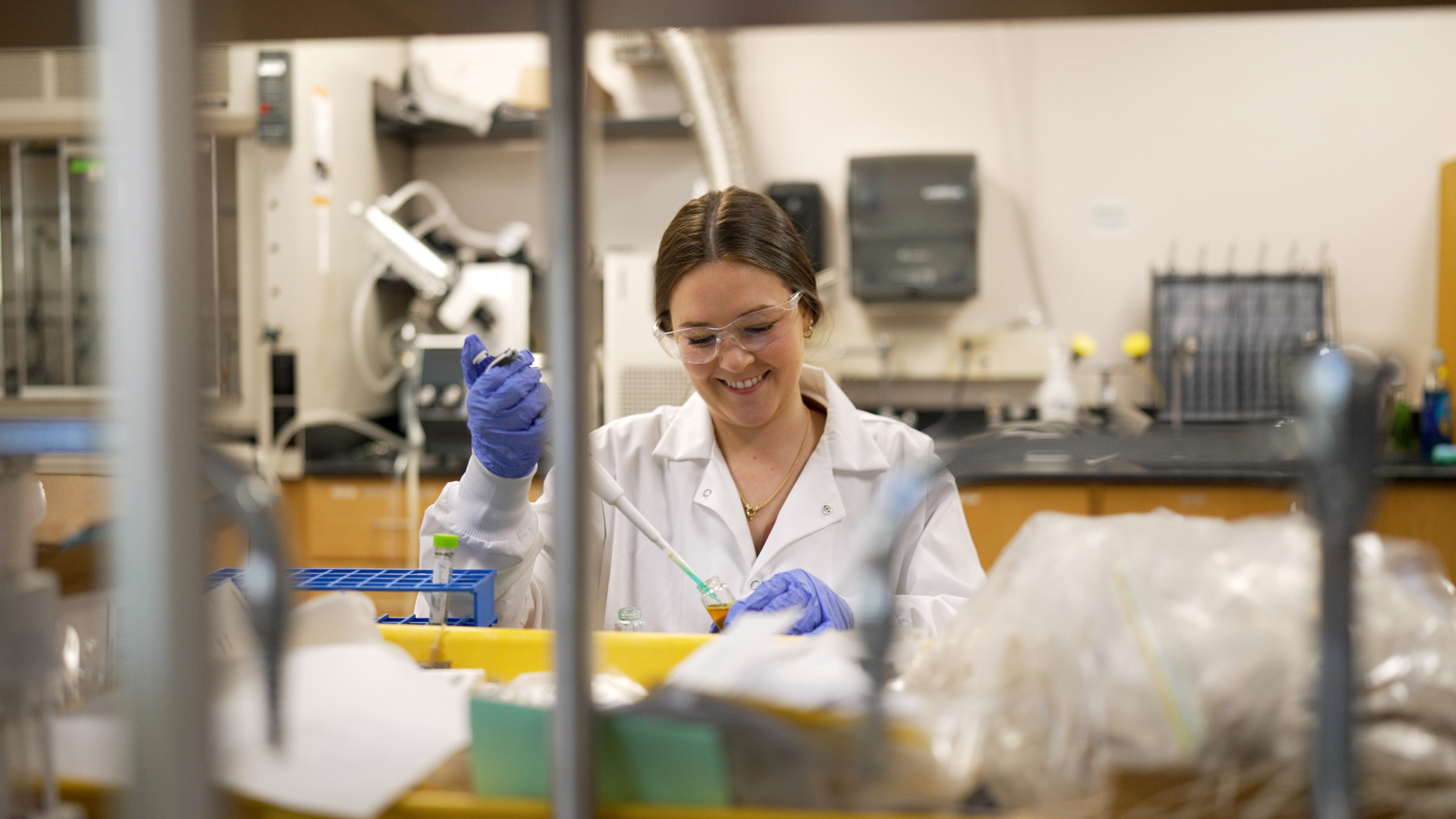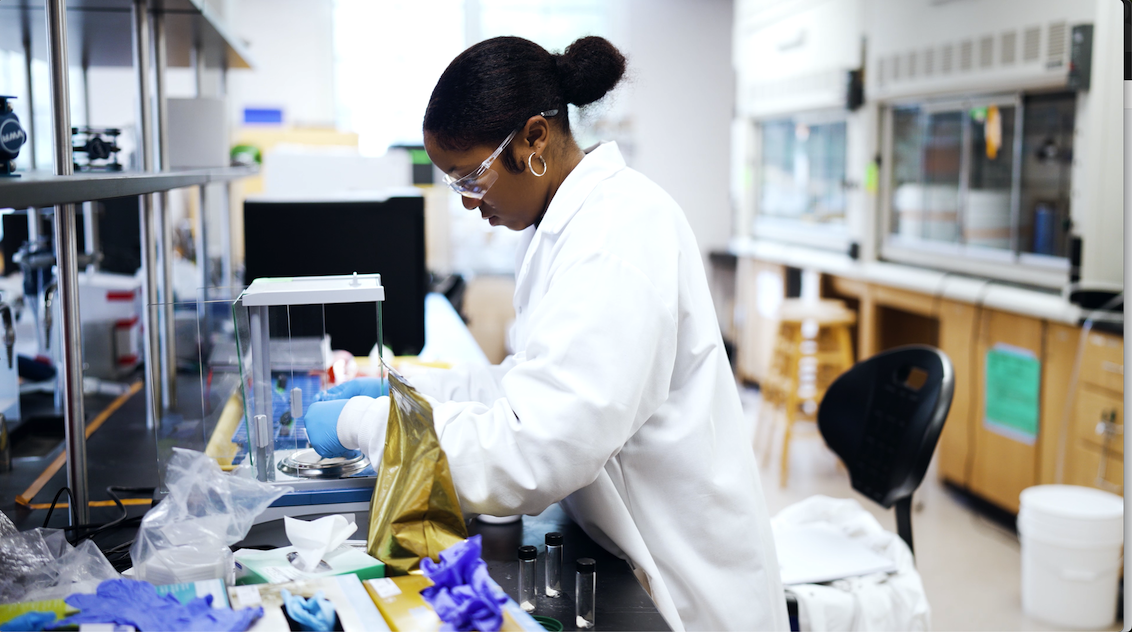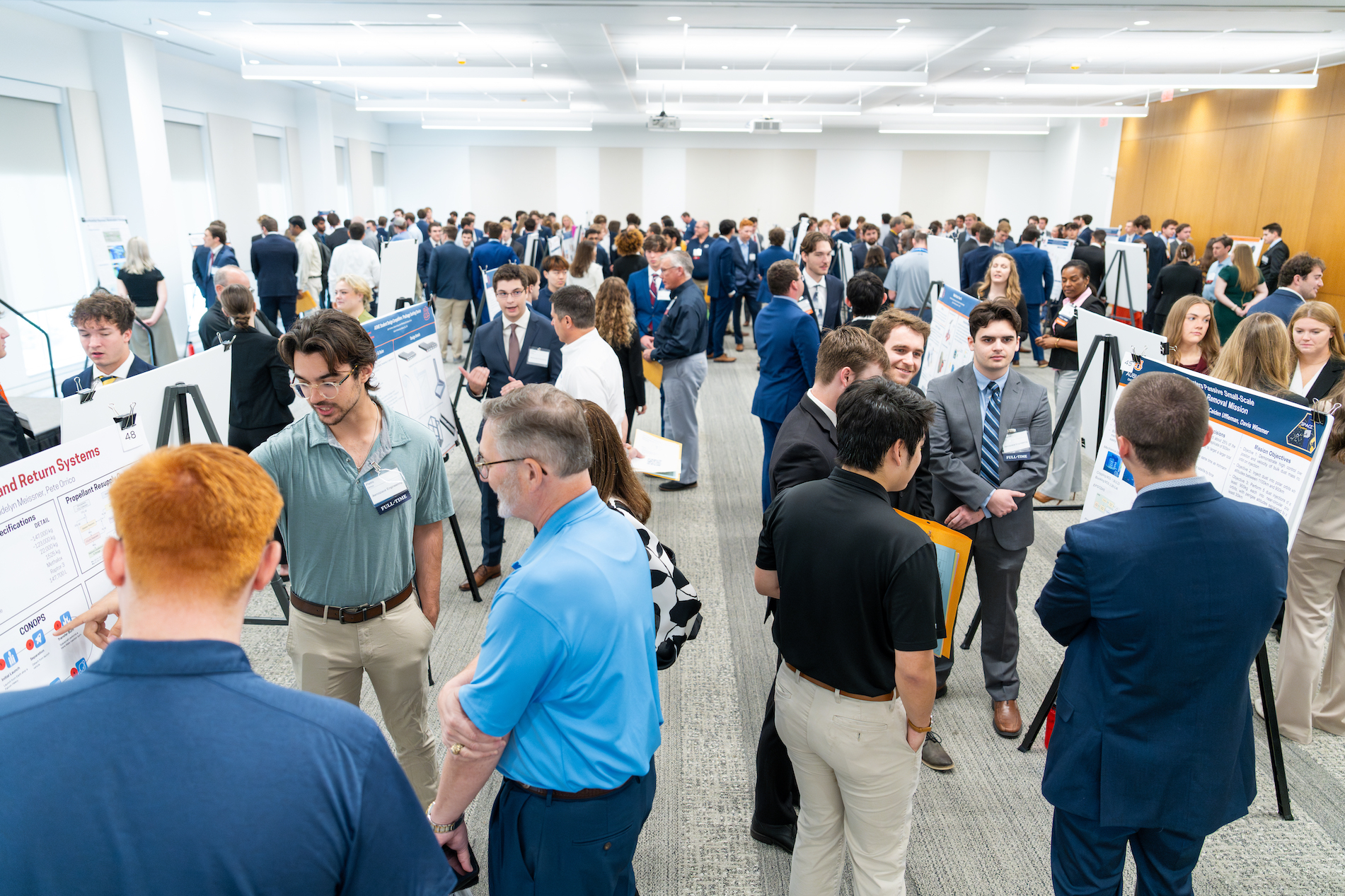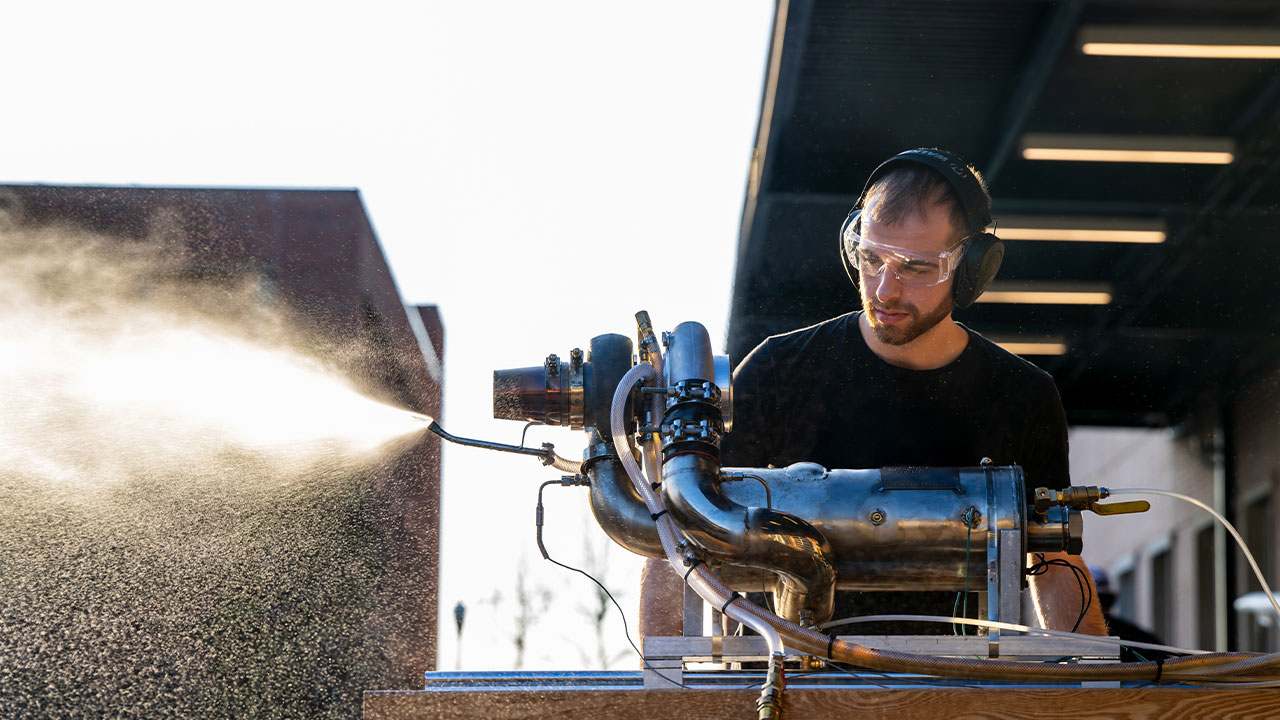
Jordan Clemmons grew up believing she would one day become a doctor or nurse.
Either way, she was determined to help people through medicine.
Then COVID-19 struck.
“I was a junior in high school, and my family’s experience during the pandemic made me realize the importance of medical research,” said the senior in chemical engineering. “Witnessing fear and helplessness due to the lack of vaccines motivated me to somehow contribute. I wanted to make a positive impact. I thought, ‘I can make a significant impact one day by developing medicines used by healthcare professionals.’”
Through biomedical research as an undergraduate student at Auburn University, she’s already on her way.
Clemmons, a Samuel Ginn College of Engineering Undergraduate Research Fellow since 2022, has been busy in chemical engineering Assistant Professor Symone Alexander’s laboratory developing microgels that mimic dietary fiber to absorb toxins and release probiotics as an alternative treatment for chronic kidney disease. This has the potential to improve patient outcomes and reduce the need for dialysis. Her study, “Addition of self-assembling small molecules to cellulose hydrogels to enhance gelation and tune microstructure,” was published in the Journal of Undergraduate Research.
She’s not a graduate research assistant. She’s not pursuing a doctorate (yet). She’s a graduating senior — just four years removed from high school in Huntsville — and she’s one of 250 undergraduate researchers in the College of Engineering and 1,000 at Auburn University.
Undergraduate students at Auburn Engineering aren’t just studying calculus II or linear differential equations.
Some are taking deep dives, for example, into the contractile function of engineered cardiac tissues through enriched fatty acid media, performing a transcriptomic analysis of 3D engineered tissues grown in hydrogel microspheres and even completing a spectral signature analysis for rapid, non-destructive diagnosis of pest-induced stress in strawberries.
This isn’t your father’s undergraduate engineering education.
“Undergraduate research plays a crucial role in developing well-rounded students by fostering critical thinking, problem-solving skills and hands-on experience,” said Dean Hendrix, associate dean for undergraduate studies and program assessment. “Engaging in research allows our students to explore their passions, contribute to cutting-edge advancements and prepare for successful careers. We are proud of the innovative work our students produce, and we believe that these experiences are instrumental in shaping the future leaders of engineering.”
Maria Auad, associate dean for graduate studies and faculty development and the Gavin Distinguished Professor, said new undergraduate research applications have exploded in the past year — rising from 25 to 64.
“While research has traditionally been associated with graduate students, our undergraduates are proving they can also contribute significantly to advancing knowledge and innovation,” Auad said. “This shift is not only enhancing their educational experience but also preparing them to be leaders in their fields.

“This surge in popularity is driven by the recognition that research experience is invaluable, providing hands-on learning, critical thinking and problem-solving skills that are essential in today’s competitive job market,” she added.
Lorenzo Cremaschi, director of undergraduate research at Auburn University and the Henry Burt Jr. Professor of mechanical engineering, said engaging in research helps students understand how the real world works.
“Employers notice these hidden skills, which are highly attractive,” he said. “I’ve observed this over my three years in this position. Students often don’t realize they can effectively communicate and explain their research with confidence. This ability impresses potential employers and sets them apart. When students work on projects, they often need to go beyond what they learn in class, acquiring new skills and knowledge. This process is self-driven, requiring them to take initiative and learn independently. They may not realize it at first, but they develop not only technical skills but also self-discipline and curiosity in their quest for solutions.”
Cremaschi said research is distinct from regular coursework.

Unlike the structured nature of homework, quizzes and exams, research involves exploring uncharted territories.
He said successful students learn to persevere through failures, an inherent part of the research journey.
“Sometimes, not confirming the anticipated initial hypothesis can also yield significant insights,” he said.
Cremaschi said integrating education with an undergraduate research experience at Auburn offers several key benefits:
- Enhanced educational experience: Students gain hands-on experience and practical skills that complement their classroom learning.
- Improved job opportunities: The skills and knowledge acquired through research make students more competitive in the job market.
- High satisfaction: Students often find their research experiences fulfilling and rewarding, contributing to their overall satisfaction with their education at Auburn.
- Strong graduate school preparation: Undergraduate research equips students with the necessary skills and experience to excel in graduate programs.
- Retention in the state of Alabama: Many students choose to stay in Alabama for their graduate and professional education, contributing to the state’s academic and professional communities, and ultimately, the state economy.
“When undergraduate students move into research roles, they bring fresh perspectives looking at the research questions,” Cremaschi said. “Unlike longer-term projects, undergraduate research often focuses on shorter-term questions that need answers. The undergraduate students can bring new viewpoints and are adept at hands-on tasks like building, constructing and designing. This approach benefits both graduate students and postdocs.”
Carolina Vellenich Triboni, a graduating senior in civil engineering, recently assisted Associate Professor Jose Vasconcelos with projects aimed to mitigate geysering (erupting), flash floods and stormwater system failures.
She believed research as an undergraduate would serve as an ideal springboard for the next steps in graduate school.
“I saw undergraduate research as a means to build my network with faculty, peers and other professionals,” she said. “Additionally, I knew research would provide me with useful technical and non-technical skills I could implement throughout my education and career.”
She was right.
“This experience taught me about the complexity of developing and reporting research,” said Triboni, whose work, “Evolution and Characterization of Pressurized Flow Conditions in Stormwater Collection Networks,” has been published in the Journal of Hydraulic Engineering. “For instance, I experienced the thoroughness that goes into a literature review. I also learned that only a portion of a project makes it into a paper. Simplifying complex results into a coherent analysis taught me the importance of effective communication. A well-made figure is worth a thousand lines in a chart.
“I believe the most relevant lesson from my research experience has been dependability and time management. I learned how to efficiently balance coursework with extracurricular projects and activities while maintaining the quality of my work. Additionally, I had to become more comfortable with giving and receiving constructive criticism. I learned to advocate for my needs while still being a collaborative member of a team. I know these skills will be transferable to my future educational and professional career,” she added.

Alison Boardwine, a graduating senior in biosystems engineering, researched the toxicity effects of micro/nano plastics on aquatic crustaceans as well as analyzing heavy metal contents in sediment samples of the Great Lakes in the Ecotoxicology and Risk Assessment Laboratory with Associate Professor Tham Hoang through the School of Fisheries, Aquaculture and Aquatic Sciences.
“This experience allowed me to understand how a functional research laboratory is run and managed,” she said. “I have had exposure to many ecotoxicology fields of study, scientific instruments, data analyzation methods and scientific writing. Now, I have a strong understanding of the scientific method and taking a project from the start of a research question to the conclusion with revisions along the way.
“Additionally, working with academic professionals and other students has been an extremely valuable experience for me in terms of my communication skills and that will no doubt help me prepare for my career after Auburn,” she added.
How can students get involved?
Ask a professor or department administrator, as Clemmons, Triboni and Boardwine did.
Students can also reach out to the university’s Office of Undergraduate Research, which is within the Office of the Senior Vice President for Research and Economic Development at Auburn.
Located at 206 Cater Hall, the office provides students with enriching research opportunities that enhance their academic and professional journeys. The office offers a platform for students to engage in meaningful research projects across various disciplines, fostering a culture of innovation and scholarly excellence.
Key opportunities and initiatives include:
Undergraduate Research Fellowship Program: This program supports students in their research endeavors, providing resources and mentorship to help them succeed.
Auburn University Journal of Undergraduate Scholarship: A publication that showcases the diverse research projects undertaken by Auburn students.
Annual Auburn Research Symposium: An event where graduate students, undergraduate students and post-doctoral students present their research findings to the university community, encouraging collaboration and knowledge sharing.
“The office encourages students to engage in hands-on research projects that extend beyond classroom learning, fostering skills that are highly valued by employers and graduate schools,” Cremaschi said. “By participating in undergraduate research, students gain practical experience, develop self-discipline and enhance their problem-solving abilities.”
Clemmons began her college career hoping to make an impact on the development of new medicines to help people.
She leaves Auburn better prepared to tackle a doctoral program at Princeton University, where she begins this fall, and take her research to the next level.
“Undergraduate research at Auburn has been an incredible journey,” she said. “It improved my time management and technical writing skills and helped me build amazing connections with Ph.D. students and mentors. I highly encourage other students to dive into this exciting challenge. It’s a fantastic way to prepare for a successful career in research or industry. It’s the perfect foundation.”